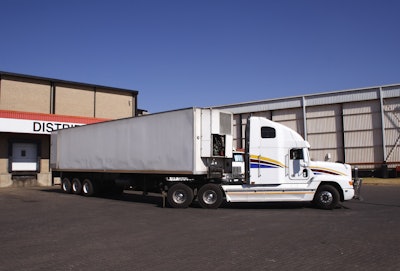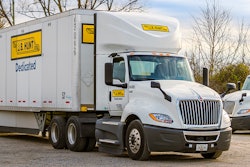
As the freight recession shows signs of winding down, logistics professionals face a critical decision point: continue riding the wave of cheap freight and the spot market rollercoaster, or secure stability through Dedicated Contract Carriage (DCC).
There are signs (finally!) of light at the end of the tunnel. For example, the Arizona State/Colorado State Logistics Manager’s Index is showing freight rates rising (albeit from a low base and at a slow rate) for several months in a row now. This, coupled with the recent and well-publicized DOT enforcement action against undocumented drivers and counterfeit CDLs, should mean that freight rates are poised to rise in 2026. Plus, history shows that rates always rise after being depressed—the only question is when, and by how much? A case can be made that now is the time for shippers to act—not react.
DCC offers more than predictable pricing. It’s a strategic hedge against volatility, a tool for operational excellence, and a pathway to stronger customer relationships. Waiting could mean missing the window to lock in capacity and cost certainty (at historically low rates, no less) before the market turns.
The freight market Is turning
Freight cycles are notoriously unforgiving. After extended downturns, rate spikes often follow as capacity tightens and demand rebounds, meaning shippers who delay these decisions risk exposure to unpredictable costs and service disruptions.
By securing a dedicated fleet now, shippers can insulate themselves from the coming rate surge. DCC agreements typically offer multi-year pricing stability, helping logistics teams forecast budgets with confidence and avoid the chaos of seasonal rate hikes.
More than a cost strategy
While cost predictability is a major draw, DCC delivers a suite of strategic advantages:
- Guaranteed Capacity: Dedicated fleets ensure availability even during peak seasons, eliminating the scramble for trucks.
- Improved Service Levels: Drivers trained specifically for your business deliver consistent, branded service that enhances customer experience.
- Risk Mitigation: DCC providers handle compliance, insurance, and safety—reducing liability and administrative burden.
- Operational Consistency: Fewer disruptions mean better planning, smoother operations, and happier customers.
Metrics that matter
To make informed decisions, shippers should monitor key performance indicators that reveal the true cost and value of their transportation strategy.
On-time delivery performance and customer satisfaction scores reveal a tremendous amount regarding your reputation, while driver turnover rates show how well you recruit and retain drivers. In addition, having a good handle on your fleet utilization and empty miles determines how efficiently you’re utilizing assets. Comparing cost per mile (or translating it to cost per stop) versus spot market rates is helpful in determining how much you’re paying for reliability.
These metrics often reveal hidden inefficiencies that DCC can resolve, so be sure to carefully consider their impact on your fleet operations.
Considerations for private fleet owners
For shippers operating private fleets, outsourcing to a DCC provider can be a transformative and scary move—thus it requires careful evaluation. For example, are your fleet costs truly competitive when factoring in maintenance, insurance, and compliance? What’s your exposure to regulatory risk and liability? How quickly can you scale? These types of questions are vital to ask in order to understand what’s the right move.
Many private fleets struggle with aging equipment, driver shortages, and rising costs. DCC providers offer modern equipment, professional drivers, and scalable solutions that align with business growth. So, ask yourself, is fleet management a core business competency—or a distraction?
Real-world success
A Dedicated Contract Carriage provider recently helped a mid-sized regional tile wholesaler convert its aging legacy private fleet to a DCC model. Facing rising insurance premiums, driver challenges, and managerial headaches, the company transitioned to the provider's dedicated solution, which included late-model equipment and safety-focused operations. They even onboarded existing company drivers into the program, preserving continuity and morale.
The result? Reduced liability, improved uptime, better cost predictability, and enhanced ability to pivot quickly to changing market conditions and customer shipment patterns. Oh, and the tile wholesaler’s signs and branding are still on the trucks.
DCC: a tool for supply chain resilience
In today’s unpredictable environment, supply chain resilience is non-negotiable.
Successful shippers are already using DCC in several strategic ways, such as maintaining service continuity on an ongoing basis as well as during disruptions and expanding into new markets. And when those market conditions change, DCC helps you stay agile and responsive. Not to mention, you have the chance to strengthen customer retention and acquisition at a time when winning every business opportunity is paramount. Remember to communicate that dedicated fleets offer the flexibility and reliability needed to navigate supply chain shocks and competitive pressures.
The freight market is shifting. Shippers who act now can lock in cost stability, secure capacity and drivers, and elevate service quality before the next rate surge. Dedicated Contract Carriage isn’t just a transportation solution—it’s a strategic investment in your supply chain’s future.











